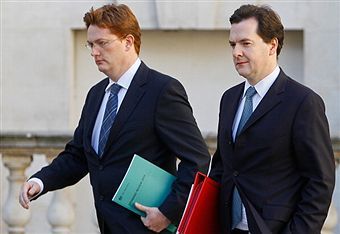 In the end, George Osborne didn’t flinch. The Chancellor is a clever political operator
– too clever, sometimes – but the result is a cuts package that has surprisingly broad popular support. And this has been achieved, in part, by including measures that strike the likes
of me as economically unwise. So much of this budget was known in advance that we didn’t find out much new today. The below points are my thoughts not on the overall package – which I
strongly support – but the pieces of it that we learned today:
In the end, George Osborne didn’t flinch. The Chancellor is a clever political operator
– too clever, sometimes – but the result is a cuts package that has surprisingly broad popular support. And this has been achieved, in part, by including measures that strike the likes
of me as economically unwise. So much of this budget was known in advance that we didn’t find out much new today. The below points are my thoughts not on the overall package – which I
strongly support – but the pieces of it that we learned today:
1) Total state spending is falling by 3.3 percent in real terms over the next four years, at a lower level than the 3.7 percent forecast in the Budget. Welfare is falling to soften departmental cuts to the extent that even the IFS now say that Osborne’s cuts are the deepest since April 1976 – not since the war. Osborne’s actually increased total state spending by £2 billion, with extra capital.
2) But, that aside, Osborne stuck to his guns. He deserves credit for not “reprofiling” the cuts – to save the pain for later in the Parliament – as some (Chris Huhne) suggested he might.
3) The phrase “3 percent cut over four years” puts into perspective phrases like “bloodiest cuts since the war/the 20s/since man discovered fire”. Strikingly, in today’s money, the cuts are £23.3bn by 2014-15 – that is the fall, in today’s money, in total government spending. The fall in government departments is £42.2bn. Both figures are smaller than the £81bn of savings which the Treasury talks about – which includes £11bn of welfare savings, etc. Much of these are offset by rising costs elsewhere.
4) The total consolidation is to reduce spending by 7.5 percent of GDP by 2015/16. CoffeeHousers may remember Will Hutton claiming this is the most attempted by a government in modern times. We look at this claim in tomorrow’s magazine – by historical standards, it’s not that high up the top ten.
5) Iain Duncan Smith’s Universal Credit – Osborne has set aside £2 billion to do it. This is great news, as this is the single best hope the government has of fixing what I call the British Economic Dysfunction. I had worried they were might end up fudging this. Osborne hopes to save £7 billion over the next four years on welfare – a pretty ambitious target, by some rather opaque methods.
6) I’m pleased that Gove has a good education settlement, but money isn’t the problem for the “free schools” policy. Its greatest threat is that new schools are assailed by dodgy legal challenges from the enemies of school reform. Gove did very well to have real-terms increases in the schools budget, but his success in protecting new schools from spurious challenges will determine the outcome of English education.
7) Osborne’s election pledge to protect the NHS and boost DfID has distorted this spending review. Defence has fallen by £2.3 billion, and international aid is up by £2.7 billion. These are odd priorities for a country at war – and a country about to let trains charge commuters 30 percent more. A YouGov poll the other day showed just 4 percent of the public agree with Osborne on this.
8) I’m not convinced by Osborne’s parting claim that he cut non-protected departments by 19 percent versus 20 percent under Labour. The IFS figures – which I tend to trust – is that across all departments Labour would have cut by 12 percent and Osborne by 14 percent. But that was before Osborne tried his wee AMEDEL manoeuvre, an accounting trick which softens reduces departmental cuts while leaving total cuts unchanged. Osborne’s claim – “we’re cutting less than Labour would have” – sits oddly beside his claim that he is cutting the deficit more quickly. This sounds fishy to me, and if I were Osborne I wouldn’t dwell on it.
9) That decile graph again. It’s there, on p98, as Pete blogged earlier. How long will it take for the IFS to produce their own version, and claim that the CSR is not “fair” after all? I would prefer for Osborne to set his own definition of fairness: i.e. that people who work hard for low salaries are charged no tax.
10) Alan Johnson really was lacking in any ideas. There now seems to be a vacuum where Labour’s economic policy used to be. Osborne has a great chance to finally break free of Labour’s collapsed intellectual framework. For too long, he has coached things in Labour language – thinking it politically astute. This didn’t work in the election. We say in The Spectator tomorrow that now the budget for the next four years is done, it’s time for him to go out and make the case for fiscal conservatism. It’s headlined “the point of Osborne’s scalpel”.







Comments